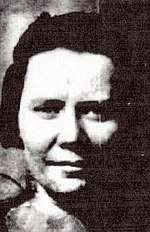Gertrude Beasley
Edna Gertrude Beasley (June 20, 1892 - July 25, 1955) was an American writer and memoirist. A feminist, her controversial 1925 autobiography, My First Thirty Years (published in Paris, France) received some favorable reviews but was also suppressed, and she soon after disappeared. Decades after her death, researchers found that when she returned to the United States in the late 1920s, she was committed to a state mental asylum in New York for the rest of her life.[1][2][3]
Gertrude Beasley | |
|---|---|
 | |
| Born | Edna Gertrude Beasley June 20, 1892 near Cross Plains, Texas, U.S. |
| Died | July 25, 1955 (aged 63) Islip, New York, U.S. |
| Occupation | Writer, teacher |
| Nationality | American |
| Education | Simmons College University of Chicago |
| Notable works | My First Thirty Years |
Life
Edna Gertrude Beasley was born on June 20, 1892 near Cross Plains, Texas. Her father was an itinerant, subsistence farmer. She was the ninth-child of a 13-child, poor family, and according to Beasely, her own birth was the product of marital rape. After her last sibling was born, her mother left the marriage, with the children, and moved to Abilene, Texas.[1][2]
Unlike the rest of her family, Beasley was interested in school and education. She became a teacher and obtained a teaching degree.[1] She left Texas to pursue a masters in education at the University of Chicago, which was awarded to her in 1918.[4] According to a later newspaper article, she also worked as a journalist in Chicago.[5]
By 1920, Beasely was in Tokyo, Japan where she wrote for The Far East.[4] There, she also wrote for National Geographic.[2] She then spent time working as a writer in China, and in Moscow, Russia.[6]
In Paris, France, Contact Editions published Beasely's autobiography, My First Thirty Years, in 1925. The book received some favorable notices,[1] although according to literary reviewer, H. L. Mencken, "This book, I suspect, comes out with a Paris imprint because no American publisher would risk printing it", for its frank descriptions.[5][1] Philosopher Bertrand Russel said the book was "truthful, which is illegal".[1]
Beasely was in London, where the authorities tried to deport her for her obscene book. Eventually in the late 1920s, she did sail for America, and en route she wrote a letter to U.S. State Department about her mistreatment and claimed authorities in Britain and the U.S. were trying to silence her. Almost as soon as she arrived in New York, she was committed to the state mental asylum in Islip, where she died in 1955.[1][2]
In 1989, Texas author, Larry McMurtry, along with reviving favorable interest in her book, ignited interest in what seemed like a mystery regarding what came of Beasley. Researchers, particularly, Alice W. Specht, were eventually able to put together what happened regarding her seeming disappearance, and the abrupt end to Beasley's writing career.[1][2]
Work
- Beasley, Gertrude (1925). My First Thirty Years. Paris: Contact Editions. OCLC 762568276.CS1 maint: date and year (link)
References
- Streitfeld, David (2018-12-19). "Overlooked No More: Gertrude Beasley, Who Wrote an Uncompromising Memoir, Then Vanished". The New York Times. ISSN 0362-4331. Retrieved 2020-05-21.
- Specht, Mary Helen (2011-05-17). "The Disappearance of Gertrude Beasley". Texas Observer. Retrieved 2020-05-21.
- Graham, Don (2000-07-01). "A Woman of Independent Means". Texas Monthly. Retrieved 2020-05-21.
- "The University of Chicago Magazine". Vol. XIII no. 5 (March ed.). University of Chicago, Alumni Association. 1921. p. 193. Cite magazine requires
|magazine=(help) - "Texas Reads: More About Gertrude Beasley". Texas Reads. 2009-08-21. Retrieved 2020-05-22.
- Bredin, Elizabeth (February 8, 1923). "A Word from Moscow". The University of Chicago Magazine. Vol. XV no. 6. University of Chicago, Alumni Association (published April 1923). p. 215.